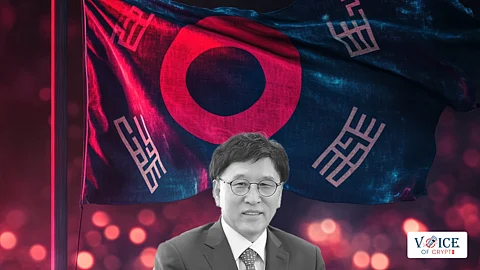

The crypto industry in South Korea could be headed toward some major change, especially if Presidential Candidate Hong Joon-pyo wins the upcoming election.
Hong has declared intentions to reform South Korea’s crypto framework, which has long been criticized for being rigid.
His announcements come right after similar moves from Donald Trump in the United States.
For Hong, blockchain technology is a lot more than a mere means of speculation in financial markets.
Instead, it is about bringing the entire public infrastructure up to speed with the rest of the world.
The crypto industry in South Korea could be headed toward some major change, especially if Presidential Candidate Hong Joon-pyo wins the upcoming election.
Hong has drawn inspiration from Donald Trump's crypto-friendly campaigns and has promised to relax existing crypto regulations, as well as boost the presence of blockchain technology within the country.
He has made several bold promises, which might present a major shift in how Asia's most technologically advanced nations will approach crypto.
Here are the details of his promises and what they could mean for crypto as a whole.
Hong Joon-pyo is a senior member of the conservative People Power Party and former mayor of Daegu.
Alongside his presidential campaigns, Hong has declared intentions to reform South Korea’s crypto framework, which has long been criticized for being rigid.
He stated during a press event in Seoul’s Yeouido district that he would “eliminate regulations as much as the Trump administration in the United States did.”
Support for crypto from South Korea | Source: Twitter
His comments come right after similar moves from Donald Trump, who recently signed a bill overturning the IRS rule that required defi platforms to follow the same standards as traditional brokerages.
The bill became the first piece of crypto law to be signed into US law and has been a clear change in stance from the country towards digital assets.
Trump’s moves so far have included establishing a Strategic Bitcoin Reserve, which shows that the US is strongly interested in crypto.
These actions from Trump appear to be affecting countries from all over the world, especially in jurisdictions like South Korea, where technological advancement takes high priority.
South Korean lawmakers have continued to watch the US's moves towards crypto for a long time.
For example, March saw several financial leaders in Seoul call for adding Bitcoin to the country's national reserves.
They also proposed the creation of a won-backed stablecoin to compete, especially in a market that is dominated by USD-pegged stablecoins like USDT.
Despite these proposals, there is still some pushback from major institutions within the country.
For example, the Bank of Korea recently dismissed the idea of creating the aforementioned Bitcoin reserves, considering issues with the cryptocurrency’s volatility.
Saying no to a crypto reserve | Source: Twitter
The BOK also cited concerns about Bitcoin’s failure to meet International Monetary Fund (IMF) standards.
Nonetheless, the shift in political winds is forcing South Korea to reconsider its current stance for (or against crypto).
More than merely deregulating the entire sector, Hong aims to integrate blockchain technology into South Korea’s administrative systems.
He sees a future where blockchain technology is used to improve public services and increase transparency while reducing inefficiencies in administration.
This move would do much to align South Korea with other countries like Estonia, which have successfully integrated blockchain solutions across various levels of government.
For Hong, blockchain technology is a lot more than a mere means of speculation in financial markets. Instead, it is about bringing the entire public infrastructure up to speed with the rest of the world.
Hong also plans to allocate 50 trillion Korean won (approximately $35 billion) over the next five years to fund research in sectors like AI, Quantum technology, and room-temperature superconductors.
Overall, as the country prepares for the elections on 3 June, neither of the two major parties (the ruling People Power Party and the opposition Democratic Party of Korea) has officially named a candidate.
However, Hong is currently one of the eight biggest contenders in the ongoing race.
Disclaimer: Voice of Crypto aims to deliver accurate and up-to-date information, but it will not be responsible for any missing facts or inaccurate information. Cryptocurrencies are highly volatile financial assets, so research and make your own financial decisions.